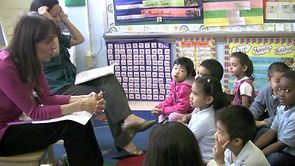English Language Learners
Page Navigation
Videos
-
Webinar: Using the ELD 2.0 Framework to Improve Instructional Programs for ELLs
In this webinar you will learn about the Framework for Raising Expectations and Instructional Rigor for English Language Learners and how the School District of Philadelphia has used this framework, dubbed ELD 2.0, to clarify the goals and re-design their instructional program for ELLs.
Video:
Classroom Example of Teaching Complex Text: ButterflyThis video features a New York City kindergarten class of English language learners demonstrating Lily Wong-Fillmore's guidance in how teachers can support students in acquiring and using academic language and working successfully with complex text.
Click here to play video
Webinars:
BIRE 2020: “Academic Rigor, High Expectations, & Asset-based Thinking”In this interactive session, Callahan and Lander come together to present a translation of research into policy and practices for our growing multilingual, immigrant-origin student population. In an engaged dialogue, Callahan and Lander will respond to and build off of the other’s expertise, with time dedicated to audience questions and concerns as well. Drawing on her research and the work of others, Callahan will present a systems-driven perspective on what we know, and what we need to know more about as a field regarding EL students’ access to academically rigorous content. In turn, Lander will present the educator and advocate perspective of the importance of access to academic rigor, drawing on her experiences as an educator and an advocate. Lander’s work in a newcomer center, engaging families and other community organizations focuses on improving EL students’ comprehensive access. The presenters will also dedicate part of the session to recommendations for engaging and working with EL, immigrant-origin families in the time of Covid.
BIRE 2020: “Deep Exploration of Worthy Topics: Key to Student Engagement and Understanding”
Denise will elaborate on the nature of understanding, guiding participants through an exercise that reveals the power inherent in understanding when learners actively engage with new information. She will explore the importance of building learning plans that engage learners in a deep dive into new territory, empowering them to make meaning of what they learn. Denise will also preview her breakout session, which will focus on how to build students' ability to draw upon classroom learning, fluidly and flexibly, to address the new challenges and solve the new and unexpected problems they might face in the future. Maryann will elaborate on an instructional approach that brings this powerful engagement and understanding to English Learners who for too long have not had access to rigorous instruction or deep exploration of worthy topics. She will provide an overview of the 3 Ls approach that through rich and robust instruction augments knowledge while also building academic language and literacy, and will touch upon exaplmes of 3Ls Deep Dive Units of Study. Maryann will also preview her breakout session in which she will elaborate on how the 3Ls approach can enhance a district's ELA/Literacy framework and will provide examples of how districts and schools are making these key shifts to their ELA/Literacy block.
BIRE 2020: “Research-based Approaches for (Bi)Literacy Instruction for Emerging Bilingual Learners”
In this presentation, Kathy Escamilla will address two important topics. The first part will discuss the findings related to research-based approaches to bilingual/dual language education that builds on English Learners' linguistic repertoires. In the second part of the presentation, Kathy will discuss the research related to literacy programs that are normed on native English speakers and how such programs require modification to acurately measure and appropriately serve emerging bilingual learners.
BIRE 2020: “How Instructional Shifts in STEM and Language Support Each Other for English Learners”
Three emerging forces promise to shape the landscape of STEM education: growing student diversity, increasing academic rigor of content standards, and advancing technological innovations. As disciplinary practices in STEM subjects (e.g., develop models, argue from evidence, construct explanations) are language intensive, engagement in these practices presents both learning opportunities and demands to all students, especially English learners. Using classroom examples, in this presentation, Okhee and Harold will highlight the mutually supportive nature of instructional shifts in STEM subjects and second language acquisition.
BIRE 2020: “Language and Mathematics Are Interconnected—One Cannot Develop Without the Other”
Deficit views of historically marginalized children, their families, and communities based on race, class, language, and culture persist in education. The COVID 19 pandemic brought this truth into sharp focus, preceded by another social evil: racial injustice. Linguistically and culturally diverse students need a coherent learning experience that empowers them to make sense of the world—through the lens of social justice—and to appreciate their power to reason, communicate, and create change. One key element of that is understanding how language and math are interconnected and mutually reinforcing. In this session, Harold will lead participants in exploring strategies for connecting language development and mathematics conceptual understanding in order to provide students full access to disciplinary thinking and concepts, and to learn to use language for academic purposes. We need to amplify, rather than simplify the language students use to communicate their thinking and critique others' thinking. We need to provide them opportunities to use language to communicate understanding.
Media Contact:
Contact Name
Contact@email.com
(000) 000-0000
Contact Name
Contact@email.com
(000) 000-0000
Contact Name
Contact@email.com
(000) 000-0000
Media Contact:
Contact Name
Contact@email.com
(000) 000-0000
Contact Name
Contact@email.com
(000) 000-0000
Contact Name
Contact@email.com
(000) 000-0000

